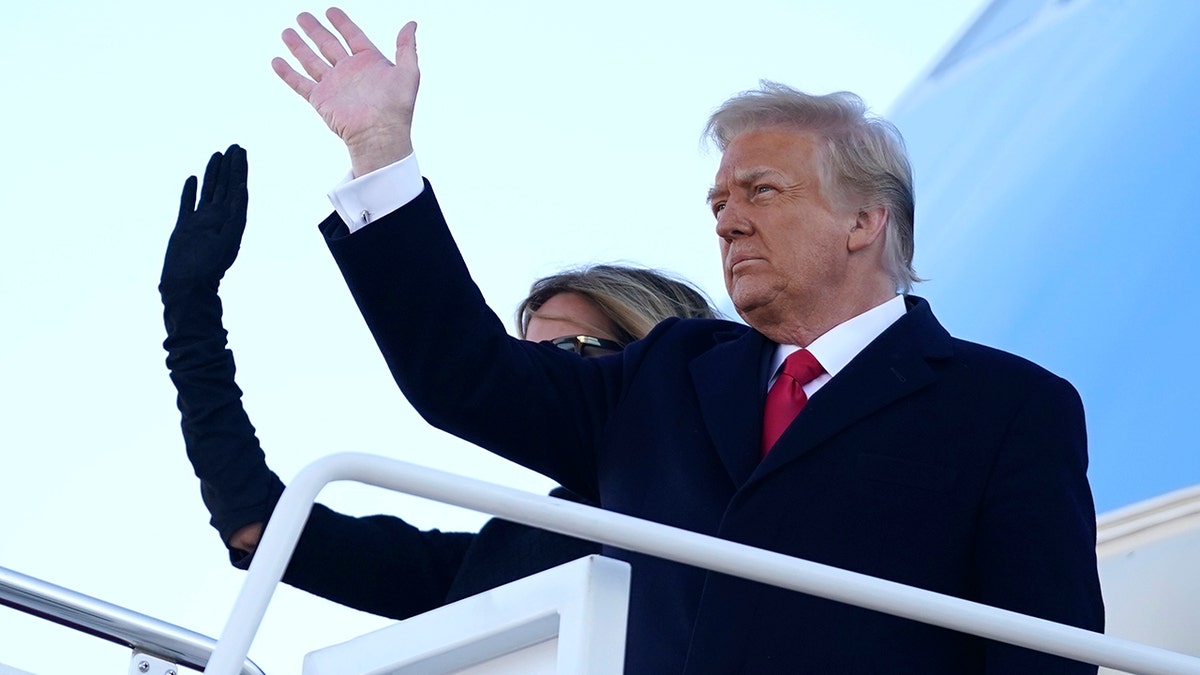Trump lawyers making First Amendment case ahead of impeachment trial
FOX News congressional correspondent Chad Pergram has the details from Capitol Hill on 'Special Report'
By a slight majority, Americans want the Senate to convict former President Trump in next week's impeachment trial, according to two new national polls.
But both surveys show an extremely wide partisan divide over whether Trump should be convicted.
WHAT TRUMP'S BEING ACCUSED OF IN THE SENATE IMPEACHMENT TRIAL
The House of Representatives last month impeached the then-president on a charge of inciting the Jan. 6 insurrection at the U.S. Capitol by right-wing extremists and other Trump supporters. The impeachment was supported by all 222 Democrats in the chamber as well as by 10 Republicans, with 197 GOP representatives voting against impeachment.

President Donald Trump and first lady Melania Trump board Air Force One at Andrews Air Force Base, Md., Wednesday, Jan. 20, 2021.(AP Photo/Manuel Balce Ceneta)
The Senate trial begins on Tuesday, Feb. 9. In a recent Senate vote, 45 of the chamber’s 50 Republicans voted against holding the trial, saying it was unconstitutional to impeach a former president. Only 5 Senate Republicans joined all 50 Democrats in rejecting the idea that a former president could not be tried on impeachment. That was a major indicator that a conviction of Trump – which needs 67 votes – would likely fall far short.
Half of all Americans want Trump convicted in the Senate trail, according to a Quinnipiac University poll released on Thursday, with 45% saying the Senate should acquit the former president. A Marist national poll released earlier in the week showed similar results, with 50% saying they want the Senate to convict Trump and 41% calling for lawmakers to acquit him.
TRUMP'S SWAY WITH GOP TAKES A HIT IN WAKE OF CAPITOL ATTACK, BUT HE STILL HOLDS FIRM GRIP OVER REPUBLICANS
But both polls spotlight a massive partisan divide.
Eighty-six percent of Democrats questioned by Quinnipiac said the Senate should convict Trump, but that number plunges to just 12% among Republicans. Independents were divided, with 49% calling for conviction and 45% acquittal.
The partisan gap was even more pronounced in the Marist poll, with 90% of Democrats but just 5% of Republicans backing an impeachment conviction. Independents supported conviction by a 49%-39% margin.

Supporters of President Donald Trump climb the west wall of the the U.S. Capitol on Wednesday, Jan. 6, 2021, in Washington. (AP Photo/Jose Luis Magana)
The Capitol was stormed by insurrectionists hoping to derail congressional certification of President Biden’s 306-232 Electoral College victory over Trump in the November election. The attack on the building took place soon after Trump urged a large crowd of supporters at a rally near the White House to march to the Capitol.
In the two months following his loss, Trump had repeatedly charged without providing concrete proof that the election "rigged" and full of "massive fraud." He claimed that the election was "stolen" and refused to concede to Biden. Trump and his allies filed over 50 unsuccessful lawsuits to contest the election results in key battleground states narrowly won by Biden.
The Quinnipiac poll indicates that more than three-quarter of Republicans still believe there was widespread fraud in the presidential election. That number plunges to 35% among independents and just 4% among Democrats.
"The impeachment question is framed by two distinctly different versions of history and offers as vivid an example of the chasm between Republicans and Democrats as you can find," Quinnipiac University polling analyst Tim Malloy highlighted.
CLICK HERE TO GET THE FOX NEWS APP
The Quinnipiac University poll was conducted Jan. 28-Feb. 1, with 1,075 adults nationwide questioned by live telephone operators. The survey’s sampling error is plus or minus 3 percentage points.
The Marist Poll was conducted Jan. 24-27, with 1,312 adults nationwide questioned by live telephone operators. The survey’s sampling error is plus or minus 3.3 percentage points.







